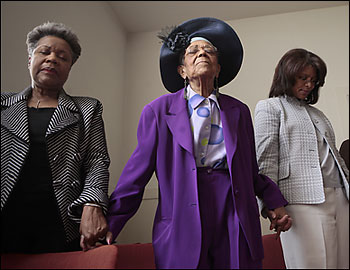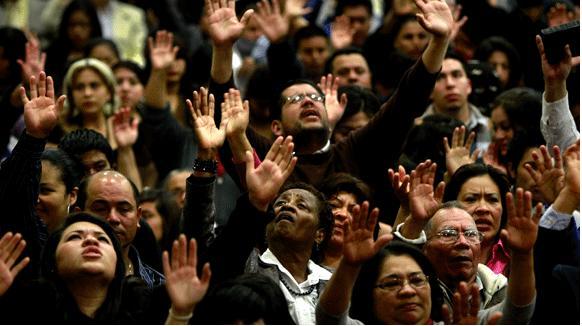What’s driving today’s polarization around race? And what’s the answer?
Two opposite answers—two narratives, if you will—are unfolding. One emphasizes systemic injustice and institutional racism. It views the problems black people face as sourced outside their community and attributes these problems to historic slavery and pervasive, systemic white oppression.
The other narrative emphasizes the importance of personal responsibility; evil is rooted in human hearts. Yes, white racism persists, but much bigger challenges confront the black community, challenges that can be overcome by the actions and decisions of black people in ways that are not ultimately dependent on the actions of white people.
Here’s the latest in our current series, A Dialogue on Racism and Christian Racial Reconciliation.
~
Scott,
I (Dennae) write this final installment, alone. I affirm everything Andrew and I have written together up to this point, but now I want to write as one city leader to another. I care about church unity in this city, but not unity in name only. I want us to embody unity by allowing the gospel to empower us to live in solidarity with the marginalized, poor, and oppressed.
We both believe the other person’s motive is a deep concern for the witness of the church and the purity of the gospel. We may also believe the other person’s behavior and language is, at least in part, participating with the spirit of the age and sowing dangerous seeds into the soil of God’s church.
My final response is written with deep desire and prayer for Christians in our city to repent and participate in a Christian renewal movement that faithfully passes down the Christian faith for generations to come. I do not write this because I am fearful of being on the wrong side of history. I do not write it because I am swept away by some romantic view of justice. I write it because God’s amazing grace did not just spiritually save me from a future hell, but also reached into my present hell and delivered me from exclusion, pain, and oppression and brought me into Christ’s light, life and family. This resulted in deliverance, adoption, healing to my physical reality, the joy of confession and a commissioning to bring this good news to others. There seems no greater place to give the world a vision of heaven then speaking and embodying Christ in places that give us tastes of hell.
I want the church to be awakened, healed, reformed, and renewed by this gospel. I want God’s people in Arizona to receive the benefits of lament and confession. I want them to then go with joy into the most painful parts of our communities and display the kingdom of God as they repair what generations of sin erode. Not to simply try to rid  the world of brokenness, but to point our pain-filled world to the future restoration of all things and invite them to join God’s mission and display that kingdom now, on earth, as it is in heaven.
the world of brokenness, but to point our pain-filled world to the future restoration of all things and invite them to join God’s mission and display that kingdom now, on earth, as it is in heaven.
I want the wealthy and the poor, the powerful and the oppressed, to see Christ’s healing restorative light break into darkness and reconcile us to one another. I want the prideful to delight in being humbled and the humble to delight in being exalted. I want us to pour out our privileges for the weakest among us. The gospel initiates, produces, and sustains this fruit.
I affirm your important desire to preserve gospel centrality; however, the behavior of ignoring evangelicalism’s participation in racial injustice and minimizing our role in systemic sin creates barriers to our world clearly seeing and hearing the gospel. I have serious concerns regarding your last response. It is too much to respond fully to so I will highlight 4 that stand out:
1) Your letter is intellectually dishonest. You cherry picked phrases from our last article, pulled them out of context and spent a majority of your response arguing about CRT. If you wanted to debate CRT, you should have made it explicit from the beginning. I would have turned down that request because I have no interest in giving any time or attention to arguing about CRT. My theological tradition affirms the creational goodness in all ideologies while also critiquing the ways they are distorted and distracting from Christ. Any affirmation we made was an attempt to (i) model that there are things to learn from social theories, but more importantly (ii) that the main voice we draw from comes from 300 years of Black church history. Just because there is shared language with social theorists and black Christian’s critique of white supremacy, does not mean Black Christians are prescribing the same solution as critical theorists or fully making the same critique.
does not mean Black Christians are prescribing the same solution as critical theorists or fully making the same critique.
Scott, compared to me—both in experience and your particular vocational calling—you have more training and know the rules of honest intellectual dialogue. I entered this discussion trusting you to debate on a set of simple rules of intellectual engagement. I think you violated those rules in similar ways Neil Shenvi violates these rules. You made many statements about CRT and Marxism that demonstrate a lack of understanding of the complexity and diversity of thinkers on the topic. You even admit to responding to the “lowest common denominator.” This is not charitable. There is not space (or interest) to really address the multiple things you mischaracterize about these theories. My concern rests in the behavior of mischaracterizing your opponents as it does not equip Christians to discern the aspects of social theorists that require a Christian response that listens in order to affirm and reject various aspects of it with the gospel. One of the common behaviors of fundamentalism is to pull things out of context in order to drive home a point you desire to make and because it sounds good to the average listener, they are persuaded while never really dealing with the actual argument that was made in the first place. It isn’t relationally or intellectually fruitful to engage in this behavior. This of course can be true of both progressives and conservatives.
2) You changed the topic. You asked me to discuss the language we were using in our Surge communication about racism, systemic oppression, the books of Black Christians we recommended as we engaged with the BLM protests happening within our city. This last letter instead ignored the many points we have made about the witness of the Black church and the call to engage their prophetic critique and instead continue to conflate their voice with CRT.
3) Critical theory. You say it is a competitor to the gospel. I agree. American Liberalism is also a competitor to the gospel. All ideologies are both important /complementary and competitors to the gospel. As you quoted Keller, you pull his quotes out of the larger context in which he wrote them, use the portions of his article to support the points you wanted to make on CRT and ignore what he said in his previous article (part 1) as well as the fact that his definition of Biblical Justice drastically differs in key areas from what you offer in your letter. This does not feel like honest engagement nor is it my experience of you on other important topics.
I have plenty of thoughts on your critique of social justice, but won’t list them here. Of course sin is individual and personal, but Scripture also shows it as systemic and social. There are plenty of thinkers and theologians who write on this, and more important, Scripture is filled with examples. Our first response went into detail about this, and you stated multiple times you agreed in large part, yet your closing arguments seem to undo your initial agreement.
The challenge I often have with your logic is the binaries and either/or you create. Because you create these binaries they always affirm some truths of Scripture. They are accurately describing an aspect of the presenting problems, but in a way that ignores other important truths. I think this is destructive behavior and poorly forms those you influence to discern truth, justice and Christian ethics.
- Dennae Pierre
… to be continued






